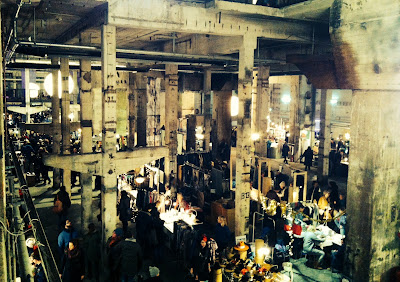It's the time of the year for lighting candles on the Adventskranz (advent wreath), for baking Plätzchen (cookies), for drinking Glühwein (mulled wine) and heading to the Weihnachstmarkt (Christmas market).
If you're looking for traditional-style Christmas markets in Berlin, the ones at Gendarmenmarkt and Schloss Charlottenburg are worth seeing.
However, if you're looking for a more "Berlin" experience then head to one of the alternative Christmas markets. Always hosted in amazing locations, with tasty quality street food (pulled pork anyone?) and DJs, you'll find lots of original gifts: pictures, clothes, jewellery, handbags, lampshades, works of art (and much more) made by local designers and often sold at bargain prices. Don't expect pretty candles, traditional Christmas decorations, felt hats, Christmas carols, Bratwurst, Kartoffelpuffer (fried potato cakes) and the Christmas traditional market fare.
 Holy Shit Shopping - for one weekend only (3rd-4th December), but if you missed the one in Berlin you could still try Stuttgart or Hamburg. The location for this well-established indoor designer market this year was the former power station Kraftwerk Berlin.
Holy Shit Shopping - for one weekend only (3rd-4th December), but if you missed the one in Berlin you could still try Stuttgart or Hamburg. The location for this well-established indoor designer market this year was the former power station Kraftwerk Berlin. 
Weihnachtsrodeo - on the weekends of 10th-11th & 17th-18th December. The location this year is Postbahnhof am Ostbahnhof. Expect plenty of designer stalls, yummy street food, hip music and of course hipsters.
Holy Heimat - open from Thursday to Sunday during the entire advent season, this alternative Christmas market offers both indoor and outdoor attractions.
The location is Haubentaucher (RAW Gelände) in Friedrichshain. As well as street food and designer pieces, there is also an ice skating rink, kid's wonderland and live music.
For a non-shopping experience, head to the Christmas Garden Berlin at the Botanical Garden in Steglitz between 5 pm and 10 pm for a magical after-dark walk in a beautifully lit park. There is also an ice-skating rink.
Whatever you do, avoid Alexanderplatz at all costs. It's a tourist trap and possibly the ugliest place in Berlin.


